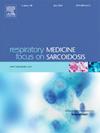dupilumab治疗严重哮喘患者的临床反应和缓解:来自丹麦全国严重哮喘登记的结果
IF 3.5
3区 医学
Q2 CARDIAC & CARDIOVASCULAR SYSTEMS
引用次数: 0
摘要
背景:随机临床试验表明,dupilumab可减少未控制和严重哮喘患者的恶化和维持口服皮质类固醇(mOCS)的使用。然而,现实生活中的证据是有限的。目的:本研究旨在评估dupilumab治疗后达到临床反应和缓解的患者比例,并确定反应的预测因素。方法:我们进行了一项前瞻性观察研究,纳入了203名来自丹麦全国严重哮喘登记册的重症哮喘患者,接受dupilumab治疗12个月。对治疗的临床反应被定义为急性发作减少50%和/或mOCS剂量减少50%。临床缓解需要满足以下所有标准:完全停止恶化,未使用mOCS,哮喘控制问卷(ACQ-6)评分1)bb0至预测值的80%。在多元逻辑回归模型中确定治疗反应的预测因子。结果:dupilumab治疗12个月后,91%的患者表现出临床反应,30%达到临床缓解。所有患者都经历了更少的恶化,而有临床反应的患者和达到缓解的患者在mOCS剂量减少、FEV1%和ACQ-6评分方面也表现出显著的改善。缓解的预测因素包括基线呼出一氧化氮分数升高[OR=3.82 (95% CI: 0.90, 16.17)],每增加一个单位体重指数[OR=0.82 (95% CI: 0.71, 0.93)],以及无变应性鼻炎[OR=0.30 (95% CI: 0.08, 1.11)]。结论:在这个现实环境中,200多名患者接受dupilumab治疗12个月,91%的患者有临床反应,30%的患者达到临床缓解。这些发现强调了dupilumab在改善严重哮喘患者预后方面的潜力。本文章由计算机程序翻译,如有差异,请以英文原文为准。
Clinical response and remission in patients treated with dupilumab for severe asthma: Results from the nationwide Danish Severe Asthma Register
Background
Randomized clinical trials have demonstrated that dupilumab reduces exacerbations and maintenance oral corticosteroids (mOCS) use in patients with uncontrolled and severe asthma. However, evidence in real-life settings is limited.
Objective
This study aimed to evaluate the proportion of patients achieving a clinical response and remission after treatment with dupilumab and identify predictors of response.
Methods
We conducted a prospective observational study involving 203 severe asthma patients from the nationwide Danish Severe Asthma Register treated with dupilumab for 12 months. Clinical response to treatment was defined as a 50 % reduction in exacerbations and/or a 50 % reduction in mOCS dose. Clinical remission required meeting all the following criteria: complete cessation of exacerbations, no mOCS use, an Asthma Control Questionnaire (ACQ-6) score <1.50 and forced expiratory volume in 1 s (FEV1) > 80 % of the predicted value. Predictors of treatment response were identified in a multivariate logistic regression model.
Results
After 12 months of dupilumab treatment, 91 % of patients demonstrated a clinical response, and 30 % achieved clinical remission. All patients experienced fewer exacerbations, while patients with a clinical response and those achieving remission also exhibited significant improvements in mOCS dose reduction, FEV1 %, and ACQ-6 score. Predictors of remission included higher baseline fractional exhaled nitric oxide [OR = 3.82 (95 % CI: 0.90, 16.17)], lower body mass index [OR = 0.82 (95 % CI: 0.71, 0.93) for one unit increase], and the absence of allergic rhinitis [OR = 0.30 (95 % CI: 0.08, 1.11)].
Conclusion
In this real-life setting, involving over 200 patients treated with dupilumab for 12 months, 91 % had a clinical response, and 30 % of patients achieved clinical remission. These findings highlight dupilumab's potential in improving outcomes for severe asthma patients.
求助全文
通过发布文献求助,成功后即可免费获取论文全文。
去求助
来源期刊

Respiratory medicine
医学-呼吸系统
CiteScore
7.50
自引率
0.00%
发文量
199
审稿时长
38 days
期刊介绍:
Respiratory Medicine is an internationally-renowned journal devoted to the rapid publication of clinically-relevant respiratory medicine research. It combines cutting-edge original research with state-of-the-art reviews dealing with all aspects of respiratory diseases and therapeutic interventions. Topics include adult and paediatric medicine, epidemiology, immunology and cell biology, physiology, occupational disorders, and the role of allergens and pollutants.
Respiratory Medicine is increasingly the journal of choice for publication of phased trial work, commenting on effectiveness, dosage and methods of action.
 求助内容:
求助内容: 应助结果提醒方式:
应助结果提醒方式:


